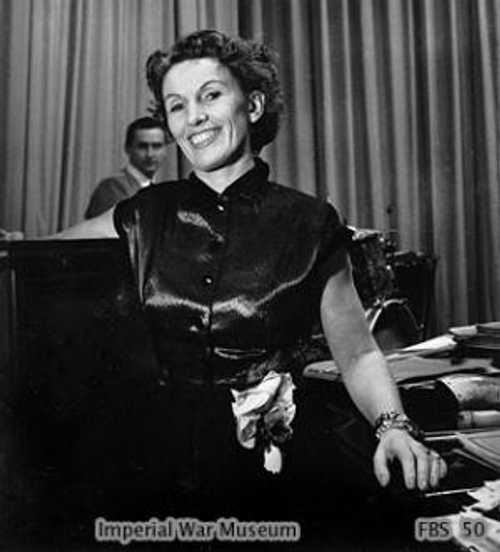
German Forces
The Angel of the Soldiers.
Imperial War Museum (collection), London.
Postwar 'photo of Lane Andersen (stage name - she was born Lise-lotte Bunnenberg), the performer of the first, and arguably definitive recordings of "The Song of the Young Sentry", otherwise known as "Lili Marleen". Andersen was an established cabaret and recording artist when, in 1939, she recorded the original German version of WW1 veteran Hans Liep's poem as set to music by Norbert Schultze. It was a total flop, selling only 700 copies. Two years later, the German-controlled Radio Belgrade was looking for new material to include in broadcasts aimed mainly at Rommel's army in North Africa. A copy of Andersen's recording of "Lili Marleen" arrived in Belgrade, unregarded, in a job lot of discs rounded up in Vienna. Again with no particular expectation, it was first broadcast from Belgrade on 18 August, 1941. The rest is, as we say, History. The record chimed with the loneliness and longing for Home of the frontline troops on both sides, and the song went on to be a huge, huge hit in multiple versions, in German, English and other languages, both for Lale Andersen and other performers. Not that this was all good news for Lale. That the British brass initially disliked the idea of the Desert Rats singing along to a German chanteuse, and only allowed the song to be played as an alternative to mutiny, was not a problem for her. However, the fact that Dr Goebbels disliked it was very much of a problem. Goebbels had been unenthusiastic about the song being recorded in the first place; he regarded it as depressing and "portentous" for the morale of German troops (anyone can make a mistake). His response was to attempt to ban it - and ban Lale from performing, into the bargain. This situation persisted for the best part of a year; during which, at the same time, Goebbels' friend and protegé Erwin Rommel was insisting on "Lili Marleen" being played over the radio nightly. In the end, Goebbels relented, grudgingly - but he still forbade (or tried to prevent) Lale from including the song in her cabaret act, and insisted on it being recorded in a slightly more "martial" version (the familiar one, with the drumbeats). Like the earlier German version, and the English one recorded by Anne Shelton, this new version proved to be another huge hit. Goebbels was one of history's most brilliant (known) propagandists, but he really missed the point on this one. "Lili Marleen" is a song that reaches beyond borders, beyond alliegences, into the heart of all lonely soldiers, and of all people far from home. Lale Andersen, "Angel of the Soldiers" died in 1972, at the early age of 67. Rest in Peace. Best regards, JR.
4293 Views
1/25/2012
